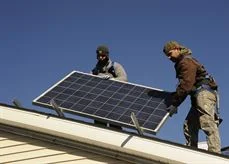By: Melanie Ramsey
On October 3, 2017, the U.S. International Trade Commission (USITC) submitted their investigation report and recommendation to the President, pursuant to the statutory requirements, in response to an alleged threat to the solar industry. [i] After three months to consider the USITC’s submission, President Trump elected to implement a tariff-quota on solar cell imports.[ii] Specifically, this tariff-quote will begin at thirty percent and decrease five percent each year thereafter, which is lower than the thirty-five percent recommended by the USITC. [iii] This safeguard will impact eighty percent of supplies that contribute to the twenty-eight billion dollar industry.[iv]
Following the President’s announcement, stocks in U.S. based companies that could benefit as a result of the tariff imposition on solar equipment experienced an aggressive increase.[v] Conversely, the loss of twenty-three thousand jobs and the delay or elimination of billion-dollar investments seems to be probable.[vi]
https://www.bloombergquint.com/business/2018/01/22/trump-taxes-solar-imports-in-biggest-blow-to-clean-energy-yet
Irrespective of domestic concerns and outrage, another possible effect can be found in the history of the nation’s tariff-quota implementation. As a member of the World Trade Organization (WTO), the U.S. is accountable for its respective international trade obligations.[vii] In times past, other member countries have applied pressure to the U.S. by disputing similar safeguards through the WTO.[viii] In light of these disputes, the tariff-quotas have provoked the WTO to push back on the U.S. remedy. [ix] The WTO requires evidence that the increase of imports caused harm to the industry.[x] Furthermore, this evidence can be supported if USITC eliminated other possible contributors to the industry’s alleged injury.[xi] Absent such evidence, the WTO’s stipulations are left unsatisfied and therefore, other countries could retaliate by means of suspending trade or the like.[xii]
President Trump should modify his decision in a manner that is consistent with the international obligations and consider alternative options.[xiii] If another short-lived tariff-quota occurred, then it would seemingly be an inefficient use of time, resources, and collaborative efforts. [xiv] Regardless, the country will endure whatever impacts are to come, albeit positive or negative. Though the President is granted this broad authority, Congress ultimately can amend the legislation. Until such action occurs, the thirty percent tariff-quota will remain in effect.
[i] 19 U.S.C.S. § 2252(b)(1)(A) (West 2018). See Ayesha Lomonaco, A Section 201 Solar Flare Up, Ky. J. Equine, Agric., & Nat. Res. L.: Blog (January13, 2018), http://www.kjeanrl.com/full-blog/lomonaco.
[ii] Keith Goldberg, Trump Tariffs Inflict Short-Term Pain on Solar Development, Law 360 (January 23, 2018, 8:09 PM), https://www.law360.com/articles/1004665?scroll=1.
[iii] Id.
[iv] Brian Eckhouse et al., Trumps Tariffs on Solar Mark Biggest Bow to Renewables Yet, Bloomberg (January 23, 2018, 4:45 PM), https://www.bloomberg.com/news/articles/2018-01-22/trump-taxes-solar-imports-in-biggest-blow-to-clean-energy-yet.
[v] Lynn Doan & Brian Eckhouse, Why Trump Is Taxing Solar Panels Imported by U.S., Bloomberg (January 23, 2018, 11:09 AM), https://www.bloomberg.com/politics/articles/2018-01-23/why-trump-is-taxing-solar-panels-imported-by-u-s-quicktake-q-a.
[vi] Id.
[vii] World Trade Org., United States-Safeguard Measures on Imports of Fresh, Chilled, or Frozen Lamb Meat from New Zealand and Australia (May 1, 2001), https://www.wto.org/english/tratop_e/dispu_e/177-178abr_e.pdf [hereinafter WTO Report].
[viii] Understanding the WTO: Settling Disputes, World Trade Org., https://www.wto.org/english/thewto_e/whatis_e/tif_e/disp1_e.htm (last visited Feb. 23, 2018).
[ix] Id.
[x] Id.
[xi] Christy Ledget, Causation of Injury in Safeguard Cases: Why the U.S. Can’t Win, 34 Law & Pol’y Int’l Bus. 713, 717, 731 (2003).
[xii] WTO Report, supra note vii.
[xiii] 19 U.S.C. § 2254(b)(1)(A)(ii) (West 2018) (authorizes the President to reduce, modify, or terminate a safeguard action if he determines that the effectiveness of the action has been impaired by changed economic circumstances).
[xiv] See, e.g., Richard W. Stevenson & Elizabeth Becker, After 21 Months, Bush Lifts Tariff on Steel Imports, N.Y. Times (Dec. 5, 2003), http://www.nytimes.com/2003/12/05/us/after-21-months-bush-lifts-tariff-on-steel-imports.html.



